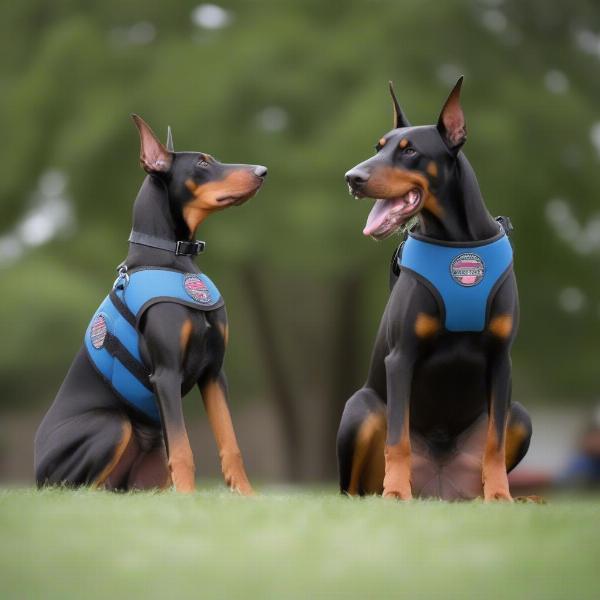The Doberman Pinscher, with its sleek physique and intelligent gaze, is often associated with protection work. But beyond guarding duties, these remarkable dogs can excel as service dogs, providing invaluable support to individuals with various needs. This comprehensive guide explores the world of service dog Dobermans, covering everything from temperament and training to the specific tasks they can perform.
Doberman Temperament and Suitability for Service Work
Dobermans are known for their intelligence, loyalty, and trainability – qualities that make them well-suited for service dog roles. Their alertness and protective instincts, while beneficial, require careful channeling through professional training. A well-trained Doberman service dog is focused, obedient, and attuned to its handler’s needs. However, it’s crucial to understand that not every Doberman is cut out for this demanding work. Temperament varies even within the breed, and early socialization and careful selection are essential for success.
 Doberman service dog in training
Doberman service dog in training
Training a Doberman for Service
Training a service dog Doberman is a significant commitment, requiring patience, consistency, and professional guidance. Basic obedience is the foundation, followed by specialized training tailored to the handler’s specific needs. Tasks can range from retrieving dropped items and opening doors to providing physical support and alerting to medical emergencies. Professional trainers experienced with service dog training and Dobermans are essential for achieving optimal results. This meticulous training process ensures the dog can perform reliably in various environments and remain calm under pressure.
Specific Tasks a Doberman Service Dog Can Perform
Dobermans can be trained to perform a wide array of tasks, making them versatile service dog partners:
- Mobility Assistance: Providing balance support, retrieving objects, and opening doors.
- Medical Alert: Alerting to changes in blood sugar, seizures, or other medical conditions.
- Psychiatric Service: Offering emotional support, interrupting anxiety attacks, and providing a sense of security.
- Hearing Assistance: Alerting to sounds like doorbells, alarms, and approaching vehicles.
Choosing a Doberman for Service Work
Selecting a Doberman puppy for service work requires careful consideration. Look for breeders who prioritize temperament and health testing. Early socialization is paramount, exposing the puppy to various sights, sounds, and experiences. Observe the puppy’s demeanor, looking for signs of intelligence, calmness, and a willingness to learn. Consulting with a professional service dog trainer during the selection process can greatly enhance your chances of finding a suitable candidate.
The Importance of Socialization and Continued Training
Even after completing formal training, socialization and ongoing practice are crucial for a service dog Doberman. Regular exposure to different environments, people, and animals helps the dog maintain its focus and composure in public settings. Continued training reinforces learned behaviors and ensures the dog remains responsive to its handler’s needs. This lifelong commitment to training and socialization is vital for maintaining the dog’s effectiveness as a service animal.
Doberman Service Dogs vs. Doberman Protection Dogs
While both service dogs and protection dogs require training, their roles are distinct. Service dogs are trained to assist individuals with disabilities, focusing on tasks that enhance independence and quality of life. Protection dogs, on the other hand, are trained to guard and defend, often involving a higher level of aggression training. It’s important to understand this fundamental difference when considering a Doberman for service work. A service dog Doberman’s temperament and training emphasize calm, focused assistance, not aggressive behavior.
Conclusion
A Doberman Pinscher can be a devoted and highly capable service dog, offering invaluable support and companionship. However, careful selection, extensive training, and ongoing socialization are essential for success. By understanding the breed’s temperament, specific training requirements, and the commitment involved, you can make an informed decision about whether a service dog Doberman is the right choice for your needs.
FAQ
- Are Dobermans good service dogs? Dobermans possess the intelligence, trainability, and loyalty to excel as service dogs, but careful selection and training are crucial.
- What tasks can a Doberman service dog perform? They can perform various tasks, including mobility assistance, medical alert, psychiatric service, and hearing assistance.
- Where can I find a reputable Doberman breeder for a service dog? Research breeders who prioritize temperament, health testing, and early socialization, and consult with a service dog trainer.
- How long does it take to train a Doberman for service work? The training process can take several months to a year or more, depending on the complexity of the tasks and the dog’s individual learning pace.
- Is it expensive to train a Doberman as a service dog? Yes, professional service dog training can be a significant investment.
- What is the difference between a service dog and a protection dog? Service dogs assist with disabilities, while protection dogs are trained for guarding and defense.
- Do Doberman service dogs require ongoing training? Yes, continued training and socialization are essential throughout the dog’s life.
ILM Dog is your trusted resource for expert advice on all aspects of dog care and ownership. We offer guidance on breed selection, health, training, nutrition, grooming, and much more. Whether you’re a first-time dog owner or a seasoned expert, ILM Dog provides valuable insights to help you navigate the joys and responsibilities of dog ownership. Contact us at [email protected] or +44 20-3965-8624 for personalized guidance tailored to your needs.